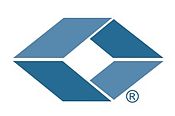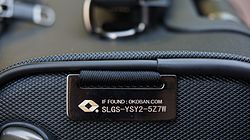- Okoban
-
Okoban 
Founded 2009 Headquarters Geneva, Switzerland Key people John Vermilye, Founder, CEO
Keisuke Hatano Director, COOWebsite okoban.com Okoban [1] is an international company that established a standard and operates the system that allows individuals to register personal property online so that in the event these are lost and found that these can be returned to their owners.
Okoban neither makes nor sells products but manages the system on behalf of the travel goods industry, airlines, TSA and other "Frequent Finders". Okoban is a spin-off of Travel Sentry,[2] the creators of the TSA Lock standard.
Contents
History
The first products based on the Okoban standard were first produced in 2009 by Sunco Luggage[3] of Japan. These included luggage and travel accessories with Okoban codes. The Okoban system is provided to end-users free of charge.
The name Okoban is based on the Japanese concept of Kōban, or small local police stations, which in Japan are the central place for reporting lost items or turning in found items. In the Japanese language the letter "O" preceding a word is a sign of respect; synonymous to "honorable". (see: Politeness in Japanese)
The Problem
According to the Baggage Report 2011 by SITA[4] there is one bag mishandled by the airlines almost every second. While most of these are returned to their owners within a few days, each month about 50,000 bags are salvaged by the airlines because they could not find their owners.
In a 2008 study conducted by the Ponemon Institute[5] sponsored by Dell there were an estimated 16,048 laptop computer lost or misplaced at the top 114 major U.S. and European and Middle East airports. Many of these were left behind at security screening checkpoints.
Procedures for handling these items found in airports vary from airport to airport but what these have in common is that these items are usually collected in a central lost and found office run by the TSA, airport or airline.
According to the Ponemon study, the average weekly number of missing laptop computers at the largest U.S. airport is 286.
Standard
The Okoban standard includes three elements:
- the diamond mark which signals to the professional lost and found offices that this is an Okoban code;
- the Unique identifier (UID) code, composed of twelve alpha-numeric characters;
- a notice to the finder: IF FOUND : OKOBAN.COM
Okoban issues Unique identifier (UID) codes to manufacturers of luggage and other products used in travel such as personal electronics. These codes are added to products at the time of production using a variety of processes, such as laser etching, adhesive labels, tags and plates. Okoban codes are also sold separately by some distributors on adhesive labels which can be added to personal items.
How it Works
The Okoban UID codes are used for registering luggage and other personal items such as passports, personal electronic devices like phones, computers, cameras which are at risk of being misplaced or lost when traveling.
To use the system a user must first create an account at the Okoban website and then register the UID of the item they are protecting.
If the item is misplaced or lost, and then found, the finder can enter the UID into the Okoban system. An alert message is then sent to the email address and/or the phone registered by the user.
The user then contacts the finder to arrange recovery. No personal information of the owner is disclosed by Okoban to the finder.
Okoban can be used by anyone finding an item at no cost to the finder or the owner. The system was designed for professional lost and found offices which are operated by almost all large organizations such as airlines, airports, law enforcement agencies (including the TSA), hotels, railways, ferries, schools, theaters, stadia and other public places.
The Okoban [6] system is integrated into WorldTracer [7] which is the central lost and found system used by the airlines. According to IATA and SITA[8] who jointly operate the system, WorldTracer is used by over 400 airline and airport companies, at over 2,000 airports worldwide.[9] When luggage or an item is found at an airport or on a flight if the airlines enter the Okoban code into their system and an alert is triggered via Okoban to inform the owner where their item has been found and how to get in touch with the finder.
References
- ^ http://www.okoban.com
- ^ http://www.travelsentry.org
- ^ http://www.suncoluggage.com/
- ^ http://www.sita.aero/content/baggage-report-2011
- ^ http://www.ponemon.org/data-security
- ^ http://www.okoban.com
- ^ http://www.sita.aero/product/worldtracer
- ^ http://sita.aero/
- ^ http://www.iata.org/whatwedo/passenger/passenger_baggage/Pages/index.aspx
External links
Categories:- Companies based in Geneva
Wikimedia Foundation. 2010.


